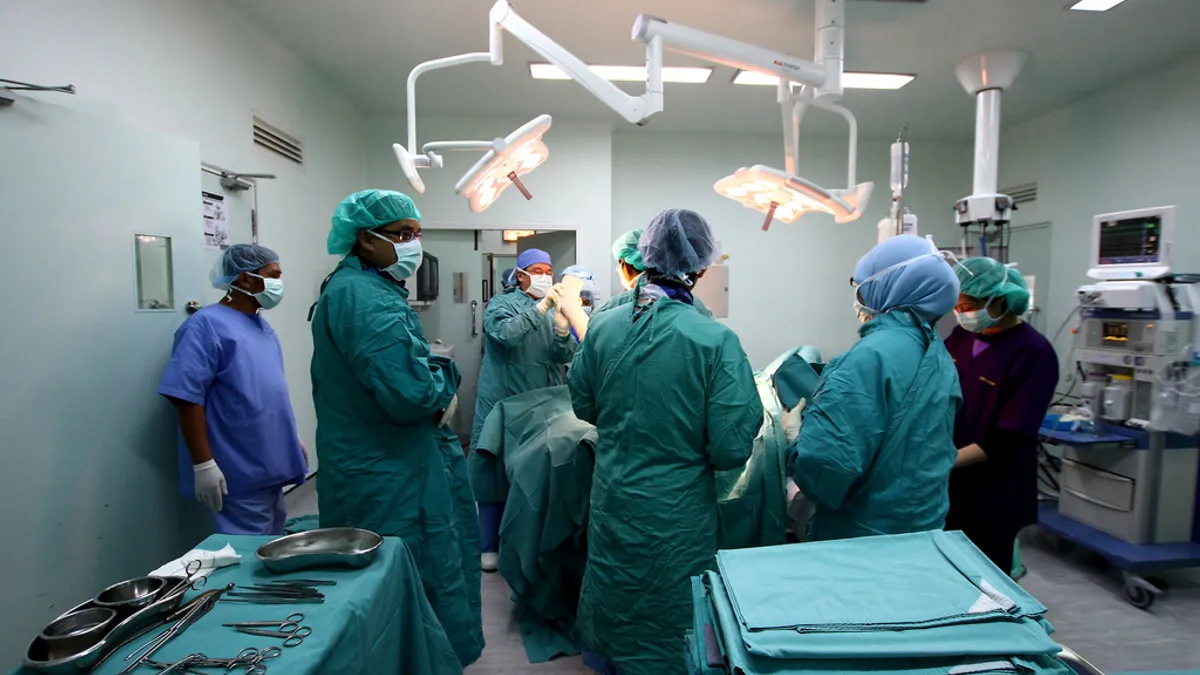Dive Brief:
- As the COVID-19 pandemic forced providers across the United States to defer many elective procedures, the number of patients who sought hospital care declined by an average of more than 50%, according to data from hospital software company Strata Decision Technology.
- Even service lines involving what are often life-threatening illnesses saw large drops, with cardiac care falling 57% and cancer care decreasing 37%, according to the analysis, which compares procedure volumes from a two week period over March and April this year to the same time frame last year.
- The cohort of 228 hospitals, representing more than 2 million patient visits, lost an estimated $1.3 billion in revenue over those two weeks, the report shows. Extrapolating those figures for nationwide impact results in a loss of $60.1 billion per month for hospitals across the country.
Dive Insight:
As the U.S. began to see community spread of the novel coronavirus and fears mounted that hospitals in hot spots could be overwhelmed with COVID-19 patients and unable to find enough equipment and providers to care for them, facilities from coast to coast took the advice of federal and state governments to free up resources by halting elective procedures.
Knee replacements, for example, all but stopped last month, the data show. Zimmer Biomet and Stryker were among the medtechs that flagged that impact.
But those services are what typically drive hospital revenue, and as the country has struggled with a coordinated response to the crisis, providers have seen the stark effects. Health systems have reported plummeting volumes in the last weeks of March — and revenue sliding with it.
Medtech companies are taking major hits as well and hope to see hospital volumes rebound in the second quarter and beyond.
And although many states are beginning to lift stay-at-home restrictions and hospitals have begun to restart deferred procedures, there is still the prospect patients won't feel comfortable coming in for non-emergency care for fear of getting sick.
A recent Needham survey showed about a third of respondents said they would be fine with having an elective procedure this quarter, but 26% would not until next year at the earliest.
The new report found preventive care falling significantly as well. Wellness visits, gynecological screenings and colonoscopies decreased by more than 75%. And chronic care also suffered, with visits for diabetes patients dropping 67% and hypertension volumes falling 37%.
Those numbers bring concerns of lasting health effects from care deferred by the COVID-19 crisis. Conditions that aren't caught and treated early on are more harmful for patients and costlier to treat later on.
Hospitals are beginning the process of ramping up services that were put on hold for much of March and April. Some may extend surgery hours into nights and weekends to help recapture the volume.
It is likely to take time, however. A Jefferies survey of orthopaedic surgeons showed they expect it will take at least six months to see a return to mostly normal volumes. Some specialty groups have released guidance to aid providers in restarting care lines, ensuring they have enough personal protective equipment and critical care capacity to do so safely.
Congress has so far allocated a total of $175 billion for providers in COVID-19 emergency relief legislation, but hospitals say it's not enough. A new bill passed by the Democrat-led House of Representatives late last week carves out another $100 billion, but is opposed by Republicans leaders in the Senate and the White House.












